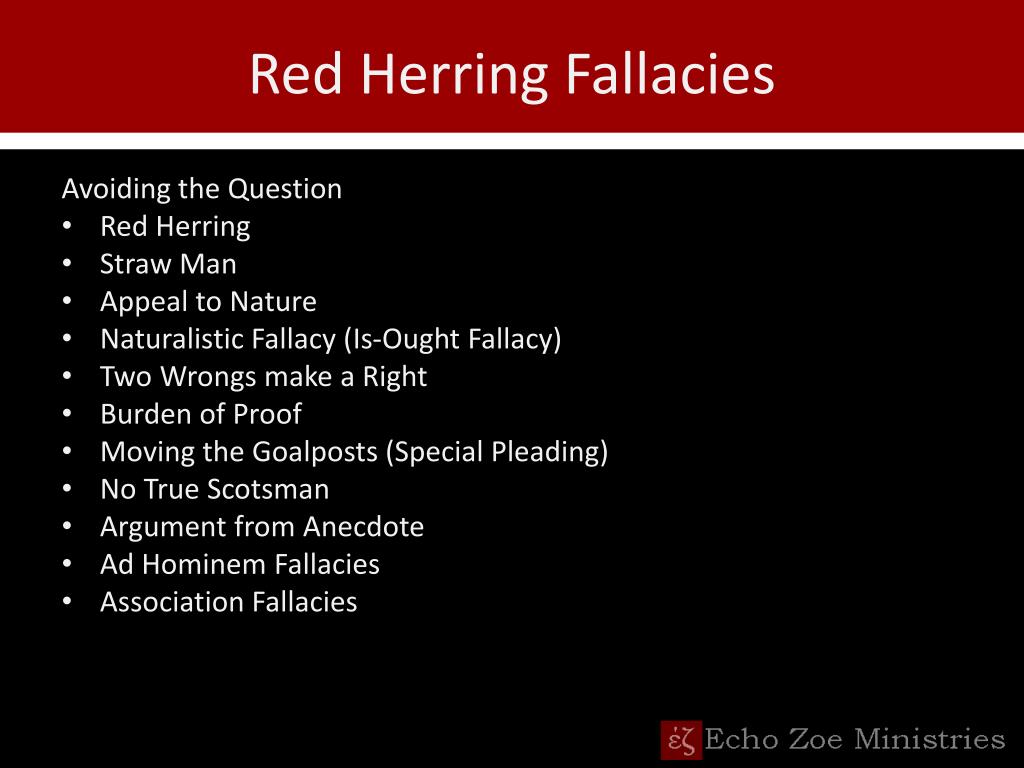


In detective stories, a red herring is a misleading clue that directs the sleuth away from the true villain. Thus, the term red herring now refers to anything that distracts a reader from the true target. The etymology of this term is unclear, but some say the term dates back to an 1807 news story by journalist William Cobbett.Ĭobbett claimed that he could train hunting dogs by using red herrings-bony fish that were salted and smoked until they turned reddish-brown-to lay a false trail and distract dogs from the scents of the targets they were supposed to be chasing.

In other words, red herrings draw the reader’s attention away from what’s really important, like a false clue that leads a detective away from the true culprit.

Ad hominem attacks are ubiquitous in political speeches and campaigns.According to the Merriam Webster Dictionary, a red herring is defined as “something that distracts attention from the real issue.” A notable exception is when the claim itself relates to some characteristics of the person, or when their credibility or moral standing is of relevance to the issue (for example when assessing testimony in a criminal trial). Commonly, however, criticising a person’s character is used in attempt to undermine some claim they have made, even though in most cases the truth of a claim is independent of any personal characteristics of the person making it. An ad hominem attack is not necessarily a logical fallacy if it is not intended to constitute an argument, in which case it can simply be considered a form of personal abuse. Ad hominem: latin for ‘to the person’, this phrase refers to an argument that is an attack on the character, motives, or other characteristics of the person making a claim, rather than any details of the claim itself.Whether or not the analogy is ‘good enough’ to avoid being fallacious depends on the details of the argument and exactly what is being claimed. Often such comparisons are weak analogies because, though some superficial or peripheral similarities to Hitler or Nazism may exist, many other relevant aspects are considerably different. Comparing a person to Adolf Hitler is a particularly common rhetorical tactic used to cast persons or ideas one dislikes in a strongly negative light. Some analogies are better (or stronger) than others, and it is common for weak analogies to be used in an attempt to draw similarities between two cases which are in fact quite different, but where similarity would be rhetorically useful for the purpose of making a particular argument. An analogy establishes that a situation is, in some relevant sense, ‘like’ another, already known or understood situation, and therefore knowledge from the previous situation can be applied to the current one. Weak analogy: an analogy is a way of explaining or understanding one thing in terms of another thing.A particularly famous example of an appeal to popularity can be found in the title of Elvis Presley’s ninth album: 50,000,000 Elvis Fans Can’t Be Wrong. Appeals to popularity are quite common in advertising and political campaigns. Appeals to popularity: the mere fact that a view is popular is (in most cases) not a reason for regarding it to be true, since many false beliefs have been and continue to be popular.Words commonly used in emotive appeals include ‘rights’, ‘innocent’, ‘authoritarian’, ‘unhealthy’, ‘unnatural’, ‘controversial’, ‘magical’, ‘remarkable’, and many more. The former are relevant to the quality of the argument, while the latter are not. the particular nouns, adjectives, tone of voice, emphasis, implied connotations, etc). the set of reasons attempting to justify the conclusion) from the language used to express the argument (i.e. Emotive language is ubiquitous in persuasive written and verbal communication, and great care must be taken to separate out the actual argument (i.e. Appeals to emotion: this is probably the most common red herring, and occurs when emotive words and phrases are used to cast some person, thing, or situation in a particular light, often either highly positive or highly negative.Some of the most common types red herrings include: Unlike certain other logical fallacies, red herrings are typically not subtle mistakes in reasoning, but rather are fairly blatant assertions of an often rhetorically powerful but logically irrelevant point. A red herring often seems significant at first glance, but usually its lack of genuine relevance is quite readily evident upon reflection. A red herring is an argument or assertion that is irrelevant to the subject under discussion, but is raised (intentionally or unintentionally) as a distraction or diversion.


 0 kommentar(er)
0 kommentar(er)
